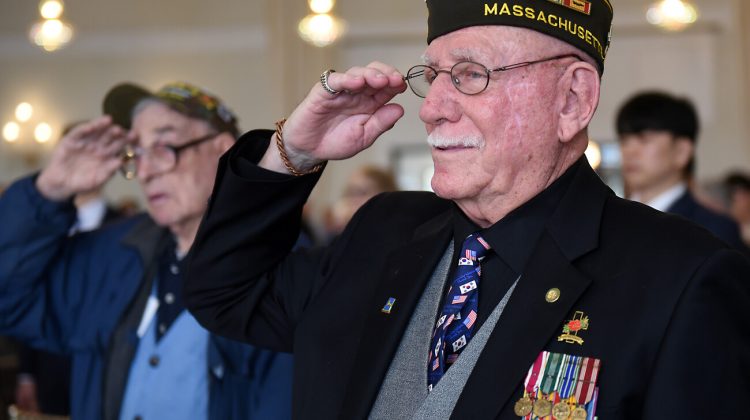LYNN — Operation Troop Support (OTS) held its 22nd anniversary celebration Sunday afternoon at the Danversport Yacht Club, where veterans of the Korean War were honored with a guest speech from Al McCarty, a United States Air Force Veteran who served in Korea.
Nine Korean War veterans attended the event, but the space was filled with service members from all branches of the United States Military of all different ages, along with their families.
Also in the audience were State Sens. Joan Lovely and Bruce Tarr, who awarded retired Air Force Lt. Col. and Founder of OTS Dick Moody with a citation thanking him and his organization for setting up the event and supporting veterans.
“We come here today with greetings from all of our colleagues in the Massachusetts State Senate to recognize your efforts, specifically to recognize those who served our nation in the Korean War,” Tarr said. “I think everyone in this room knows that the Korean War is often referred to as the Forgotten War, and that should remind us all that it is never too late to thank a veteran.”
As host of the dinner, Moody took the time to recognize each branch of the military, asking everyone who is currently serving or has served in the past to stand as their respective anthem played, and the color guard from Haverhill High School presented the flag.
Then, Moody gave thanks to each Korean War veteran. Some of the gentlemen were over the age of 100.
“These are all people that have served boots on the ground in Korea, 1950 to 1953,” Moody said. “I thought I might get one or two, and I was amazed at the turnout.”
More of the Korean War story was explained during McCarthy’s time in front of the audience of around 300 people.
“In your history books, you probably never heard anything about the Korean War. The only ones who knew about it were those of us who served there and returned from there,” McCarthy said. “It all started when the United Nations designated our allies at the time, Russia, and the United States to occupy, in a positive way, the peninsula of Korea.”
After the north and the south of the peninsula were divided at the 38th parallel, the president of the Democratic People’s Republic of Korea, Kim Il-Sung, crossed the border into the Republic of Korea with 90,000 soldiers and backing from the USSR, claiming the entire peninsula under his control.
“This generally doesn’t appear in the books, but there were 120 meetings between the UN, Russia, and the United States,” McCarthy said. “Harry Truman stepped up and said, ‘Look guys, did you see what happened to Japan? I will nuke North Korea if you don’t come to the table.’”
Eventually, after three years of fighting led by Gen. Douglas MacArthur on the American side to push the North Korean troops back to the 38th parallel, a ceasefire was signed, meaning the war actually never ended.
Giving a picture of the size of the Korean War, McCarthy listed the killed, wounded, or missing numbers of 953,000 North Koreans, 911,000 Chinese, 984,000 South Koreans, and 148,878 Americans, for a total of 2,863,577 people.
“It gives you an idea of the carnage these men right here in front us went through. They lived through that,” McCarthy said. “You know that they don’t talk about it because it’s something you just can’t fathom.”
4,400 attacks have occurred on the Korean peninsula since the signing of the ceasefire, according to McCarthy, demonstrating how the war continues affecting the Korean people.
Two South Koreans, Jeongyeol Kwak and Jay Jinseop Jang, both took the time to speak about the importance of the war and its legacy to the natives.
“This afternoon is personally special to me. As I am talking, I am now talking to my father’s combat friends in the Korean War,” Jang said. “As a young Korean soldier, my father fought side by side with American soldiers, enduring unimaginable hardship on the front line. He was wounded in battle, but thanks to bravery and the support of American soldiers, he survived.”
Both Jang and Kwak attested to the gratitude the Korean people have for American veterans of the war and how much of an honor it is to be in the same room with some of the men who fought for their country.
Particularly powerful was when Jang read a letter written by a young student in Korea, thanking the veterans for their bravery and promising to always remember their sacrifice.
“When they’re over here and they find out you’re a Korean veteran, they bow, and they thank you. They’ll never forget this, and I don’t think they ever will. They appreciate what we did for them,” McCarthy said. “When we have the chance to be with our brothers from Korea, it’s a real honor to be with them.”

